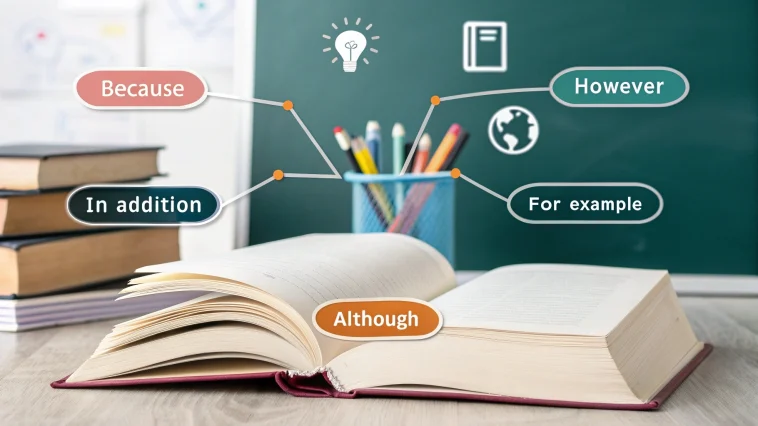Linking words connect two sentences that have a relationship in meaning or combine two main ideas into a single sentence. Their purpose is to make understanding easier and to convey meaning efficiently. Using a linking word allows us to shorten a sentence by replacing unnecessary words with the appropriate connector. Below is a simple explanation of the most important linking words in English, their meanings, and their different types.
What Are Linking Words in English?
Linking words in English are essential tools for adding primary or secondary ideas to a message. They connect ideas by showing relationships between them. For example, consider these two sentences:
- I can’t wait for you.
- I’m late.
By adding the linking word because, we can join these sentences into one while expressing a reason:
- I can’t wait for you because I’m late.
What Is the Meaning of Linking Words in English?
The phrase “linking words” can be translated literally as “linking words” in English, but a more precise term is “Subordinating Conjunctions”, which refers to secondary linking words.
What Are Subordinating Conjunctions?
There are many types of linking words in English that fall under the category of Subordinating Conjunctions. These words can be classified based on their purpose or meaning, as follows:
1- Linking Words for Emphasis
Some linking words are used to emphasize a particular idea in a sentence, such as:
- it should be noted → It is important to mention that
- undoubtedly → Certainly true; without question
- definitely → Without any doubt; for sure
- importantly → In a significant or noteworthy way
- clearly → In a way that is easy to see or understand
- without a doubt → With complete certainty
- especially → More than usual; particularly
- absolutely → Completely; totally
- never → At no time; not ever
- indeed → Truly; in fact
- particularly → More than usual; specifically
- in particular → Specifically; especially
- obviously → Clearly; without needing further explanation
Examples of Emphasis Linking Words in Sentences:
- I love pizza, in particular Italian cheese pizza.
(I love pizza, especially Italian cheese pizza.) - The house is very small, especially if you are married.
(This house is very small, especially if you are married.) - I definitely like playing football.
(I definitely love playing football.)
2- Linking Words for Addition
Some linking words in English are used to add extra meaning to a sentence and connect two ideas, where one adds new information to the other. Examples include:
- in addition to → Added to; along with
- additionally → Moreover; as another point
- an additional → An extra; another one
- furthermore → Moreover; in addition
- too → Also; as well
- besides → Apart from; in addition
- moreover → Furthermore; besides
- also → In addition; too
- as well as → In addition to; along with
- not only – but also → Both; emphasizing two things
- along with → Together with; in addition to
- apart from this → Besides this; other than this
Examples of Addition Linking Words in Sentences:
- Additionally, the restaurant will run on Friday for 20 hours.
(In addition, the restaurant will operate for 20 hours on Friday.) - I like chocolate cake. I bake it too.
(I love chocolate cake, and I also bake it.) - Animals, as well as birds, need food and water.
(Animals, as well as birds, need food and water.)
Read this article: Punctuation Marks in English: Everything You Need to Know.
3- Linking Words for Contrast
Some linking words in English show a contrast between two sentences or ideas, such as:
- though → Even if; despite the fact that
- although → Despite the fact that; even though
- while → Whereas; at the same time
- however → But; in contrast
- on the other hand → From another perspective; in contrast
- despite → Regardless of; even with
- in spite of → Despite; regardless of
- even so → Nevertheless; despite that
- nonetheless → However; in spite of that
Examples of Contrast Linking Words in Sentences:
- Although I missed the bus, I arrived on time.
(Although I missed the bus, I arrived on time.) - Despite his big car, he goes to work by bike.
(Despite having a big car, he goes to work by bike.) - This bag is very expensive. Nonetheless, I will need to buy it.
(This bag is very expensive. However, I will need to buy it.)
4- Linking Words for Explanation
Certain linking words clarify meaning or explain ideas more precisely, such as:
- for example → Used to introduce an example
- like → Similar to; for instance
- in this case → In this specific situation
- such as → Used to introduce specific examples
- including → Containing as part of a whole; as an example
Examples of Explanation Linking Words in Sentences:
- Cows give us some products, for example, milk and meat.
(Cows provide us with some products, such as milk and meat.) - Singers such as Amr Diab and Asala are very popular.
(Singers like Amr Diab and Asala are very famous.) - I speak like stars.
(I talk like celebrities.)
5- Linking Words for Comparison
Some linking words compare different or similar ideas, such as:
- equally → In the same manner or degree
- just as → In the exact same way
- similarly → In a similar manner
- in the same way → In a similar fashion
- same as → Exactly like; identical to
Examples of Comparison Linking Words in Sentences:
- Equally, not all people are honest.
(Likewise, not all people are honest.) - He is just as clever as his father.
(He is as smart as his father.) - She enjoys traveling to Paris; in the same way, her sister adores shopping.
(She loves traveling to Paris, and in the same way, her sister loves shopping.)
6- Linking Words for Cause and Effect
Some linking words show the reason for something, such as:
- because of → As a result of; due to
- in order to → For the purpose of; so that
- with this in mind → Considering this; keeping this in mind
- in fact → Actually; truly
- due to → Because of; caused by
Examples of Cause and Effect Linking Words in Sentences:
- She can’t sleep early because of doing homework.
(She can’t sleep early because she is doing homework.) - He was happy due to his birthday.
(He was happy because it was his birthday.) - They think I’m a teacher, but in fact, I’m a journalist.
(They think I’m a teacher, but actually, I’m a journalist.)
Final Notes on Using Linking Words
To correctly link sentences in English, follow these steps:
- Read the sentences carefully and understand their relationship.
- Choose the appropriate linking word based on the connection (time, place, cause, etc.).
- Make sure the linking word does not change the true meaning of the sentences.
By using linking words effectively, you can make your sentences clearer and easier to understand!
Read thish article: How to Use IF Clauses Like a Pro: Conditional Sentences Guide.




